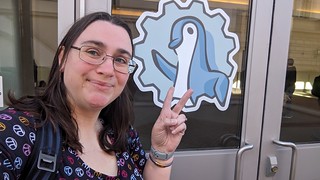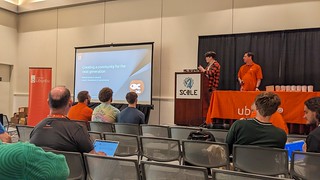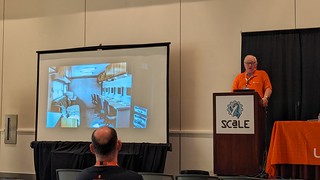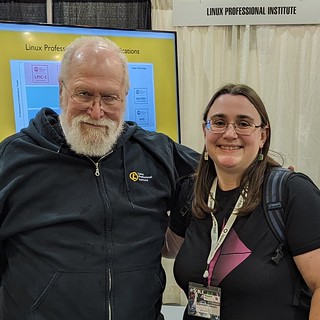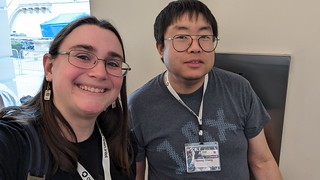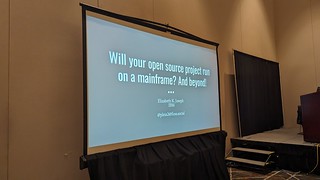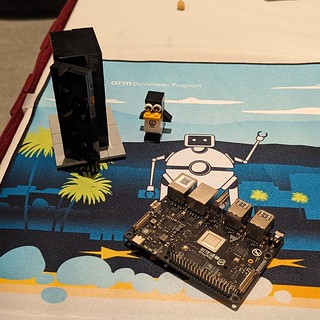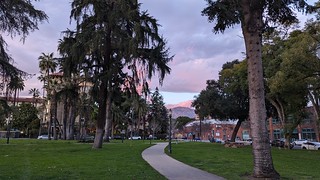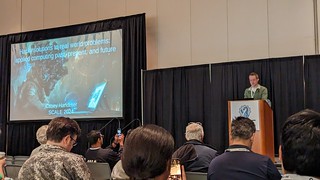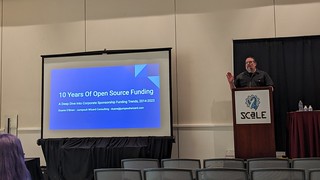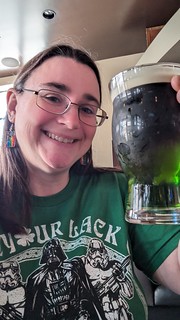The last conference I went to before the COVID-19 pandemic began was the Southern California Linux Expo, which I wrote about here: SCALE 18x. Being on the cusp of the pandemic, it was a surreal experience. But it’s still one of my favorite conferences, so I thoroughly enjoyed our time there, and the ability to bring the whole family along, which at that time just included little Adam.
Coming back to SCALE this year was like a rite of passage in this new existence in a world with COVID-19 floating around. It was an absolute pleasure to see everyone who I only see at this conference, and generally to get back into the swing of things. Plus, the first day of SCALE landed on Pi Day, so I got to wear my new pi dress! Logistically, bringing the whole family along this time didn’t work out, but we’re definitely keeping it in mind for next year.
My first stop at SCALE was an Ubucon, which just like me, had returned to SCALE for the first time since the pandemic. I quickly caught up with several old friends from the community, and then was delighted to meet Cody Smith and Simon Quigley, who I’d only known through the Ubuntu community online. It was also nice meeting some of the folks who came to the event from Canonical and the various projects they’re working on around automation and tooling, a few of whom I had the pleasure of having dinner with when the first day of the event concluded on Thursday.
Ubucon itself kicked off with a talk from Jason Nucciarone, who was standing in for a colleague who couldn’t make it, where he discussed changes that have been made in recent years to revitalize the Ubuntu community. A big one was communication methods. When I was largely involved with Ubuntu, most of the communications took place over IRC, and like many communities, the Ubuntu community had been slowly drifting away from that. Some folks went to just using the Discourse forums, others had Telegram groups, some went off to pockets of Discord. I’ve remained on a rather silent IRC partially because I don’t have a lot of time to work on Ubuntu these days, so I hadn’t looked into where to go next. Turns out, they’ve started using Matrix and it has started picking up steam. Another thing they’ve done is started up in-person events again. There’s a new Ubuntu Summit that has now had two iterations in 2022 they met in Prague and in 2023 the event was held in Riga, Latvia. The Local Community (LoCo) communities have also received a bit of an injection of activity, which is nice to see. It’s definitely a different Ubuntu community from the one I stepped back from a few years ago, but that’s the nature of communities and I was swiftly reminded at the event that Ubuntu is turning 20 years old this year. There’d be something wrong if it was the same community I created a vBulletin account on all the way back in 2005.
I also enjoyed the talk from Simon on “Open Source is Not Just Code” where he spoke about his own journey. This is quite a bit different from the list-of-things talks I’ve seen (and given!) on this topic, and I think by sharing his story and journey we got a much more memorable talk. He spoke honestly about the challenges of starting contributing as a young age, and how his curiosity and willingness to give a variety of things a try paved the way for him to become a release manager for Lubuntu and hold several other roles while he was still a teenager. I can definitely speak to his enthusiasm as well, he was a big help when I was still running the Ubuntu Weekly Newsletter, and I’m so happy to see him still contributing and making such a big impact.
Perhaps my favorite talk on the second day of Ubucon came from my friend George Mulak. I’ve known George through the Ubuntu California team for years, but his talk was my first glimpse into some of the paid work he’s done over the years. His talk was on “Setting up an Ubuntu lab for seniors and the disadvantaged” where he shared details of the mobile computer lab that he ran for communities around the Los Angeles area to learn skills and help with technical literacy. It was a fascinating project, but also connected me with Ken VanDine who works at Canonical but also participates in a non-profit that does custom images (which can be used on USB sticks) for computers they install Ubuntu on and then provide to the community, to the tune of thousands per year. It’ll be an interesting thing to explore for Partimus, since our reduced scale these days means resurrecting our netboot imaging machine doesn’t make a lot of sense anymore.
The expo hall also opened Friday afternoon, and that’s where I had the pleasure of formally meeting Jon “maddog” Hall for the first time. He’s a hero of mine, but I never gathered up the courage to say hello. No more of that! We had a lovely chat about mainframes, and on Saturday morning I went to his talk, “How Is Linux Like a Player Piano?” I adored his talk. As a fellow vintage-mechanical-things enthusiast, his love for player pianos really resonated with me, and the tale he weaved around the role of open standards and patents in the shaping of what technologies succeed was a compelling one. I also appreciate that he concluded his talk with a nod to Hedy Lamarr, whose technical collaborators during her development of frequency hopping included George Antheil, who had used player pianos in some of his own work, which was another round about way for today’s technologies to be linked to those of the past. Unfortunately, now I kinda want to have a player piano, hah!
On the topic of meeting people I had the pleasure of meeting Tommy Chang, who is famous in the mainframe world for being a hobbyist who owns a couple of vintage mainframes. It’s always a pleasure to catch up with community members who share my passion for the platform, especially at an event like a Linux conference because we have this immediate kinship, and can geek out about various historic computing finds of late. We probably won’t found a computing museum together, but it’s fun to dream about.
My own talk was on Saturday afternoon, which was on building your open source project for various architecture and titled “Will your open source project run on a mainframe? And beyond!” I brought along my VisionFive 2 and my LEGO IBM z16, which I spread out on a mat I got from the arm developer program and allowed attendees to check out along with some stickers.
On Saturday I also went to a talk from Tyler Menezes on “Nurturing the Next Generation of Open Source Contributors” where he talked about CodeDay Labs where they provide successful mentorships between students and open source maintainers and projects. It’s a fascinating project that I’ll keep in mind once I can clear more time for volunteering again, but in the shorter term it was interesting learning what college students are struggling with today when it comes to contributing, and how project maintainers can help. He covered making sure you have a CONTRIBUTING.md and ARCHITECTURE.md files so students can find their way, which should also have a quick start for building a dev environment, including on Windows. He also shared how important it was to have properly functioning tests to help them avoid making simple mistakes that slow down the contribution process and ultimately lead to reduction in enthusiasm and drive. The final piece of advice was around criteria for good-first-issue bugs for newcomers, stating that they should be rather self-contained (one file to fix?), require minimal tracing through the code base, be clearly defined so you don’t need to ask questions, and make sure they’re still applicable, since it can be incredibly frustrating to fix a bug, only to discover later it had been fixed and not documented several months ago.
Part of my time this trip to Pasadena was also spent enjoying Pasadena itself. One evening I took a long walk around the downtown and to a park southwest of the venue where I got to enjoy a spectacular sunset before doing my only take-out meal of the weekend. On Saturday evening before meeting my friend Nathan Handler for dinner, I went on a quest to find a post card to send to the boys, and along the way found some rainbow abacus earrings (perfect for celebrating St. Patrick’s Day at a Linux conference!) and got to snag a couple green doughnuts from Randy’s Donuts.
Sunday began with a keynote from Casey Handmer on “Hacky solutions to real world problems: Applied Computing Past, Present, and Future” which I really enjoyed. I think like many of us we’ve slipped into a bit of a doom loop regarding the struggling middle class in the United States and promises of AI that have questioning deliverables so far. His talk was a breath of fresh air, positivity, and real world problems and solutions that are being worked on today. He began by talking about the recent deciphering of crushed, burned, scrolls from Herculaneum by students with the help of AI-assisted technologies (article). He also shared about his own company, Terraform Industries, that’s working to do “gigascale atmospheric hydrocarbon synthesis” with the intent of producing cheap energy while also cutting CO2. He also brought some statistics about how in just my own lifetime, global poverty has gone down significantly, and a big piece of the puzzle to going further is making sure all humans have access to energy. I found myself reflecting on how myopic my views have been by focusing on what feels so hopeless at home, and I was really inspired by not only his perspective, but the fact that his company is actually doing something real to change things.
I had the pleasure of chatting with Duane O’Brian at SCALE this year, and then attended his talk in the last slot of the day where he spoke on some analysis he’s been doing on where funding is coming from and going in the open source world. He scoured historical event and foundation websites going back 10 years to see where much of the funding had come from and assembled it in a series of spreadsheets and publicly available data. It was fascinating to see the information come together, though it wasn’t particularly surprising overall. He shared a handful of other efforts around both community-driven and more academic focused approaches to digging deeper into the data, but this was a nice beginning of a glimpse into where major events and organizations in the United States are getting their funding from.
With Pi Day on the first day of SCALE, we capped off the event with another holiday: St. Patrick’s Day! I was sad to miss a festival this year that MJ and our au pair attended with the boys, but I tried to make up with it by joining my friend Mickey Lyle for lunch and having a green beer.
The event concluded with a closing keynote from Bill Cheswick, which I only caught part of due to it going a bit long and me having a flight to catch. What I caught of it was a fun trip down memory lane, but by catching the flight I did I was able to be home in time to tuck Adam and Aaron in to bed Sunday night, which is precisely where I wanted to be.
Many thanks to all the volunteers who make SCALE happen, it was great to see so many of you!


